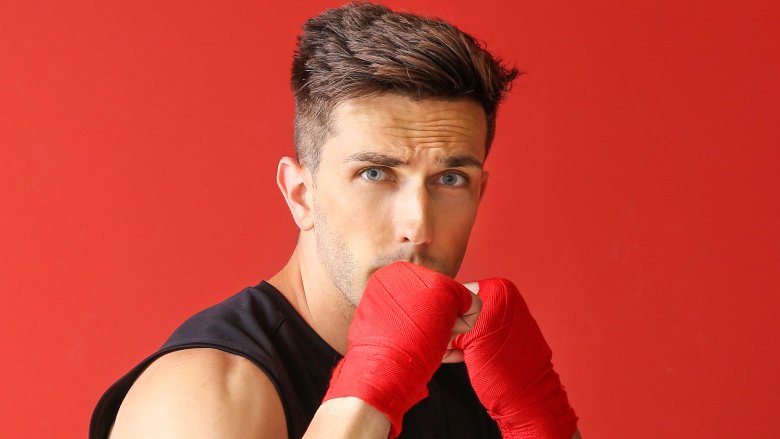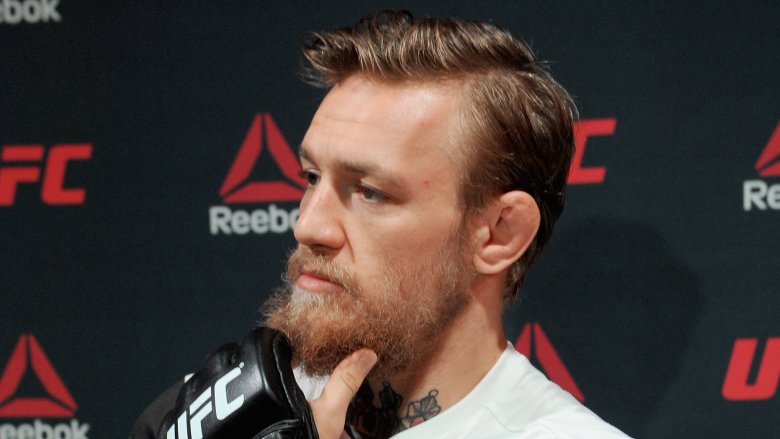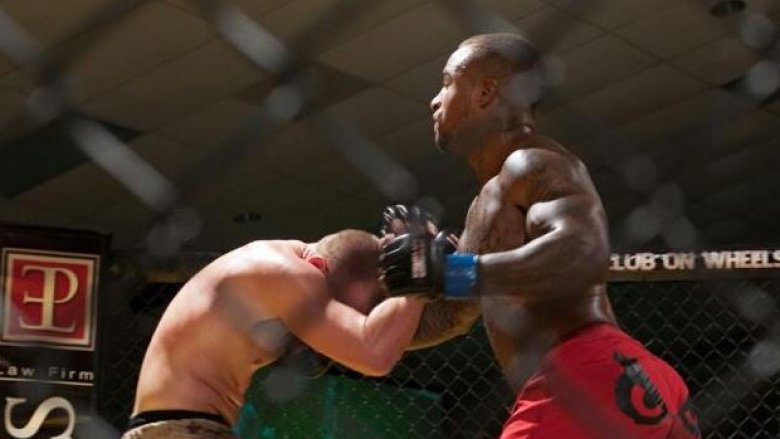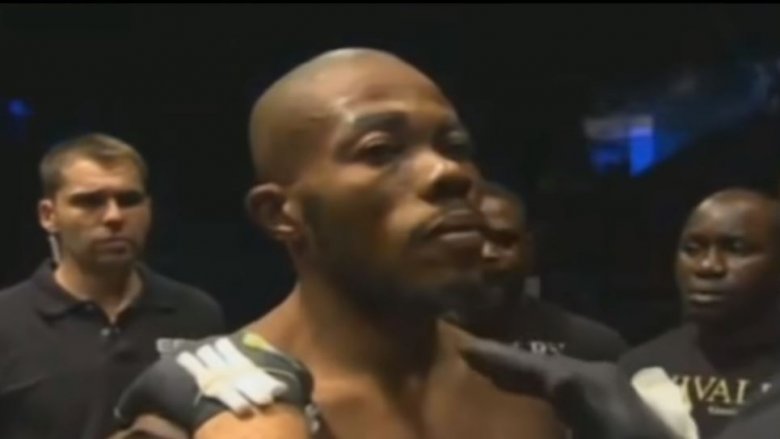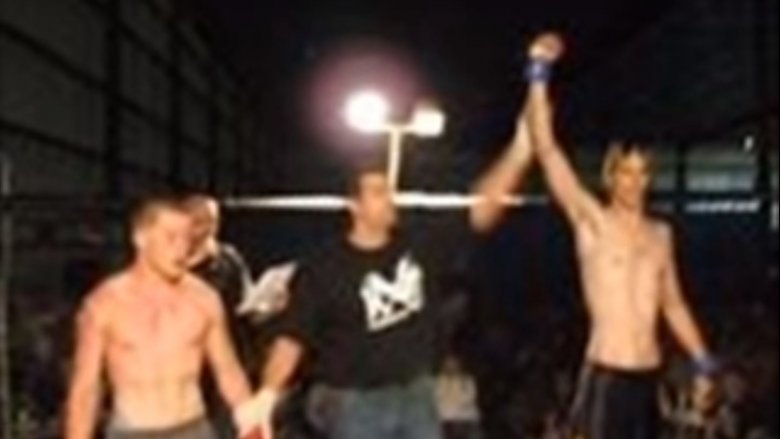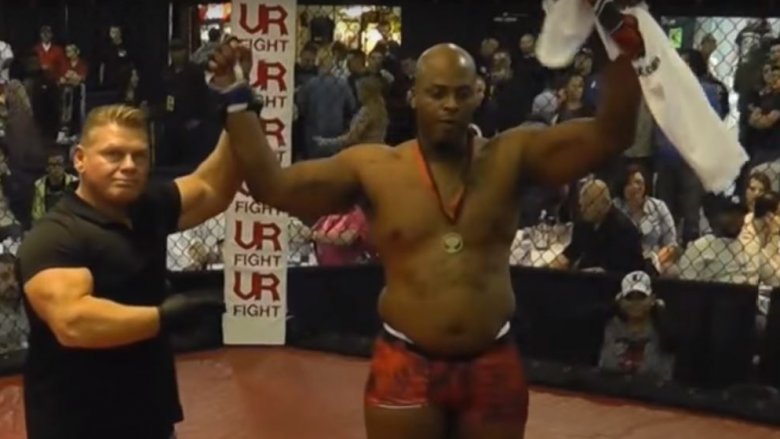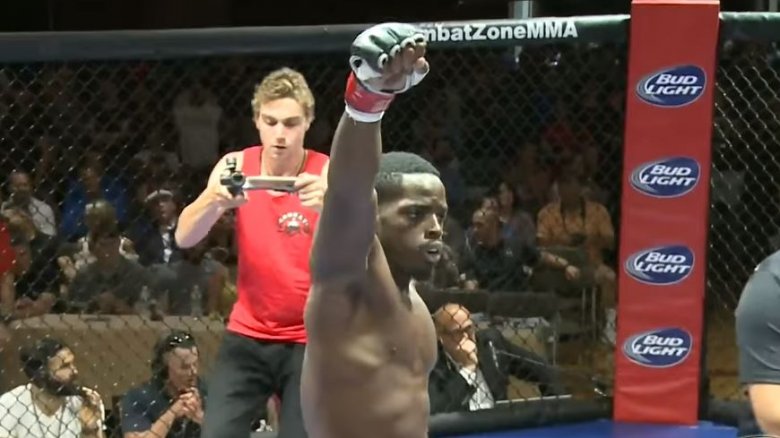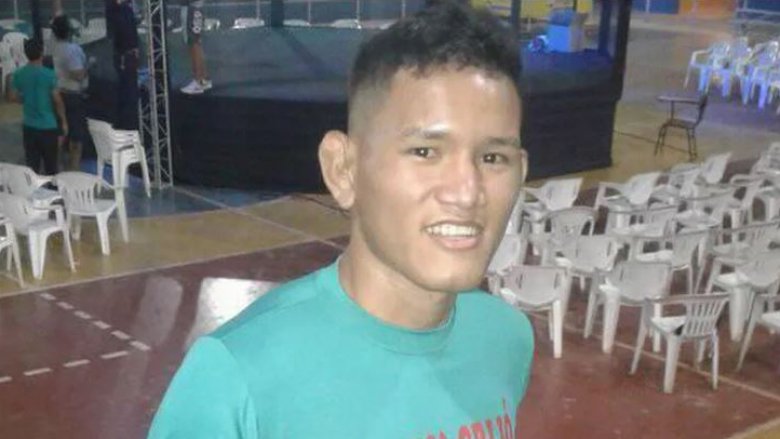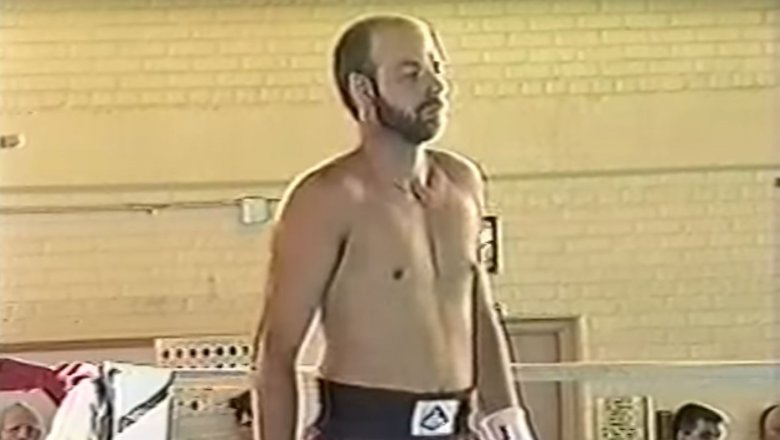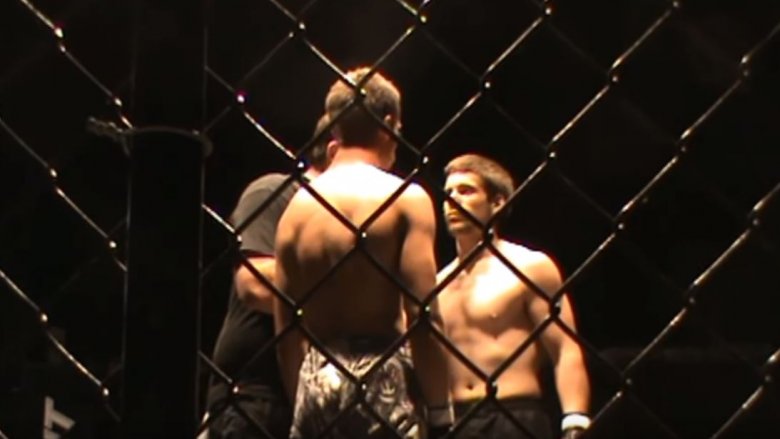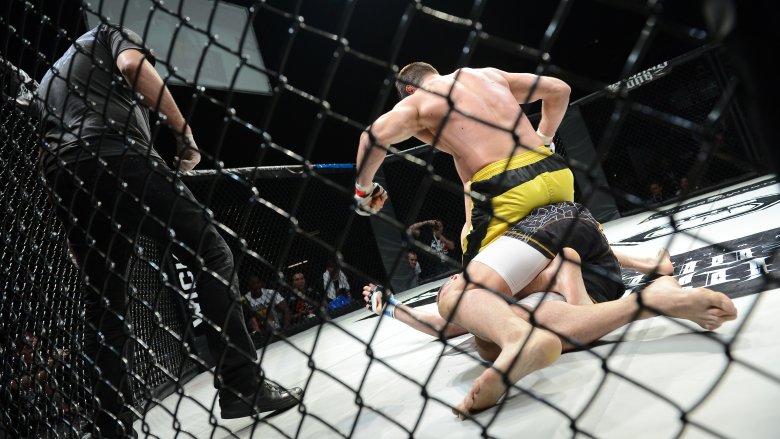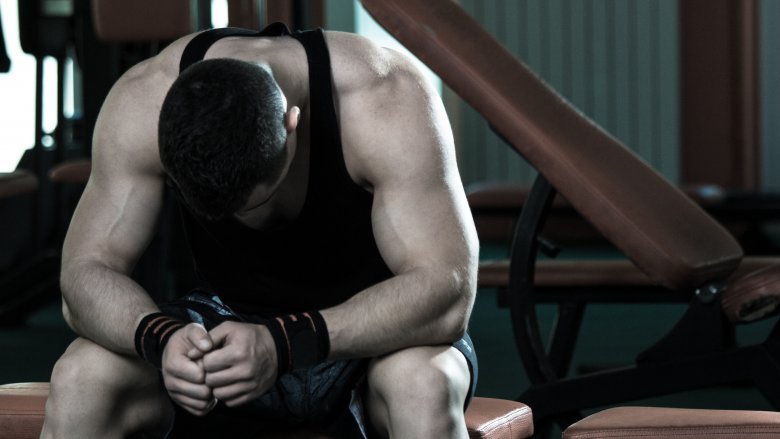MMA Fighters Who Died During A Fight
MMA fighters are the gladiators of the modern age. With fists, feet, and knees, these fearless combatants face each other in squared circles, octagons, cages, and under an assortment of competing promotions, fully prepared to give and take the kind of physical punishment that would hospitalize your average person for weeks ... if they were lucky. In fact, even hardcore professionals risk life and limb whenever they enter the ring.
On paper, modern MMA is a far cry from the lethal martial arts tournaments we saw in 1980s sports movies. There are all sorts of rules, regulations, and referees to make the sport more house-trained than your average unsanctioned street fight. Still, at the end of the day, it's still all about two skillful individuals pounding and twisting each other to submission, unconsciousness, or both. That makes MMA a dangerous game where injuries and accidents can happen all too easily, and sometimes, people even die in the ring. Here are the tragic stories of MMA fighters who died fighting.
Conor McGregor's teammate accidentally killed João Carvalho
One of the most high-profile MMA deaths happened in 2016 when, as the Irish Independent reports, João Carvalho fought in Dublin against MMA superstar Conor McGregor's teammate Charlie Ward. The referee had to stop the brutal fight in the third round, but sadly, this was too late for Carvalho. Despite receiving first-class care, his condition worsened after the match and he was rushed to the hospital, where he died 48 hours later. The Irish Independent notes that the death was caused by head trauma from the 41 headshots he received, and an inquest eventually ruled "death by misadventure."
Everyone involved was understandably crushed, but the usually in-your-face McGregor (who felt that the referee should have stopped the match earlier) seemed especially shaken. Sports Joe reports he immediately posted a heartfelt homage to Carvalho on Facebook, admitting that he had a tough time processing the incident. Experts even speculate that Carvalho's death may have been the thing that eventually prompted McGregor to announce his retirement on Twitter.
Four months after the tragedy, McGregor opened up about it for Men's Health (via Sports Joe), and said that he'd deliberately been avoiding the media while trying to cope. "How do I feel? How would you feel?" said the uncharacteristically solemn Notorious. "It's f***** up. I wasn't just watching that fight. I helped train a guy to kill someone, and then someone wound up dying."
Sam Vasquez made the worst kind of history
On October 20, 2007, MMA fighter Sam Vasquez made history, though it was the kind he almost certainly would have preferred to avoid attaching his name to. As Sherdog tells us, this was the day Vasquez fought his third professional MMA fight, against Vince Libardi at Houston's Toyota Center. In the third round, Libardi caught Vasquez with a match-ending punch. Unbeknownst to both men, it would also be a life-ending one: Vasquez's legs soon failed him, and he was taken to a hospital where he went through a number of surgical procedures to relieve pressure in his brain. They were unsuccessful, and the poor, comatose Vasquez perished after six weeks, without regaining consciousness. He was the first U.S fighter to die because of a fight injury.
While the autopsy revealed that Vasquez died of blunt force trauma to the head, at least part of the damage may have happened before Libardi's blow. Earlier in the match, Vasquez had hit his head in a ring post during a takedown, and though he remained active, a recording of the match revealed this clearly disoriented him. Multiple medical professionals believe this was the hit that ultimately killed Vasquez, but his death wasn't completely in vain. Because of the tragedy, officials started looking into rules about goal post padding and other safety features to prevent such incidents in the future.
Tyrone Mims' mysterious death
Tyrone Mims had a lot going for him. Sherdog tells us that apart from his budding MMA career, he was a nascent reality star in an online reality show called Georgia Boys Grits-N-Glory. Sadly, both careers were cut tragically short on August 11, 2012, when the 30-year-old Mims became unresponsive after what MMA Junkie reports was his first amateur fight. The rest of the event was canceled and Mims was rushed to hospital, where he was pronounced dead.
The strange thing, however, is that no one seems to know just how he died. This wasn't some backwoods tournament where ringside medical attention consists of the promoter's dog licking fighters' wounds. The event was arranged according to the regulations of the South Carolina Athletic Commission, which meant elaborate pre-match physicals and fight day examinations by ringside doctors. No one noticed anything wrong with Mims, and even a forensic autopsy couldn't determine a cause of death. There were no concussions or other deadly injuries. An investigation failed to find any drugs, alcohol, or even underlying genetic causes to his demise. All the coroner could do was speculate that Mims might have had some unnoticeable heartbeat issues ... but since that can't be seen postmortem, all the officials could do was to file Mims' death under "mystery."
Booto Guylain and the fatal elbow hit
International Business Times tells us early 2014 was a pretty bad time for MMA. The reason for this was the sad fate of Booto Guylain, a South African mixed martial artist who died in the ring after taking a nasty elbow in the head. The 29-year-old was facing Keron Davies in an Extreme Fighting Championship Africa match in Johannesburg when Davies' elbow connected. Guylain was immediately knocked unconscious and rushed to the hospital after being stabilized by the ringside medical professionals. Bleacher Report notes that Guylain was treated for "swelling and bleeding on the brain," but his injuries ultimately proved fatal.
Guylain's untimely passing made waves in the MMA community, especially because this was the second death of a fighter within a comparatively short period of time. Just six months earlier, Brazilian mixed martial artist Leandro Souza died before his fight because he had tried to cut weight too dramatically and his body simply couldn't handle it.
Michael Kirkham's lack of medical check
As MMA Fighting tells us, Michael "Tree" Kirkham was a very peculiarly built fighter. The self-taught warrior's 6'9,155-pound body meant that he had reach to spare, but as his last two fights tragically demonstrated, this alone wasn't always enough to win. Kirkham's father recalls watching Tree's final amateur bout, where the opponent "beat the heck out of the back of Michael's head to the point where it was beet red." This was enough for the officials to place Kirkham on a 30-day "medical suspension." Unfortunately, it appears that the fighter neglected to have a doctor look at his injuries, possibly because it was too expensive.
On June 24, 2010, Kirkham's ban ended. Two days later, he competed in his first professional match at the University of South Carolina Aiken Convocation Center. His opponent, Carlos Iraburo, made quick work of the poor Tree with a takedown and some headshots, and the referee stopped the match after just 40 seconds. Soon after that, Kirkham lost consciousness, and passed away two days later. Although his demise was unexpected and awful, not even his father blames Iraburo for the incident. Instead, it appears that Kirkham's fatal brain hemorrhage occurred because of a badly understood phenomenon known as second-impact syndrome, where two hard blows to the head — even if you receive them weeks apart — can combine to completely "overwhelm" the body, resulting in massive swelling of the brain and a fifty-fifty chance of death.
Donshay White fought with hypertensive heart disease
"My chest hurts" is one of the worst sentences one can utter in any given situation, but it's particularly alarming when the speaker is competing in an amateur MMA bout. According to Courier-Journal, this is exactly what happened in July 2017, just before Donshay White lost his fight, "collapsed" backstage and never rose again. Leo Weekly tells us that White had already been quite winded during his heavyweight match against Ricky Muse, and that this wasn't the first time he had mentioned chest pains. However, his comments never made it to the ears of the ringside doctor, who cleared White to fight.
After the tragedy befell, officials soon discovered dramatic warning signs that could have prevented White's death had the promoters only known about them. The 37-year-old White was suffering from a hypertensive heart disease and had not been taking his blood pressure medication. Unfortunately, the fight took place in Kentucky, where amateur MMA laws don't require particularly ardent medical checks. While it was unlikely that the fight itself killed White — his death was officially caused by a "cardiac event" caused by his disease — he was still cleared to fight despite his lack of training and fitness, which led to serious discussions about the fighters' safety in the state. But as of 2018, very little progress to reform Kentucky's amateur MMA safety appears to have taken place.
Rondel Clark and the dangers of extreme weight cutting
As MMA Fighting tells us, weight cutting — the practice of rapidly losing lots of pounds to make it to the weight class you're fighting in — is dangerous. For Rondel Clark, an amateur fighter from Sutton, Massachussetts, it was lethally so. In August 2017, Clark fought his second MMA fight, losing via TKO but barely taking a hit. Three days later, the 26-year-old fighter was dead.
At first, no one could figure out what had happened, since the only sign of physical discomfort Clark had displayed was exhaustion shortly before his defeat. However, it soon transpired that he had done a 15-20 pound weight cut without expert supervision, which had wreaked havoc on his body. In fact, starting from his kidneys, Clark's entire system had shut down because he was so dried up. His official cause of death was a grisly-sounding condition called rhabdomyolysis, which means his muscle tissue basically started falling apart due to extreme dehydration combined with excessive physical strain.
Though Clark's demise was a tragedy, it prompted his family to try and make something good out of it. They established the Rondel Clark Foundation, which "seeks to raise awareness and education about extreme weight cutting" by fighting the ingrained MMA culture that they say quietly encourages weight cutting tactics.
Mateus Fernandes and the tragic relapse
There are all sorts of performance enhancers for most every sport, but hard drugs are generally not considered to be among them. As MMA Fighting reports, a 22-year-old Brazilian MMA fighter called Mateus Fernandes found this out in the worst possible way when he lost his amateur fight in 2019. After his opponent Obed Pereira unleashed a flurry of punches on him, Fernandes, who had been looking uncommonly sweaty, had a seizure and ultimately died in hospital after suffering no less than four heart attacks caused by an alleged drug overdose.
To add an extra layer of sadness to the incident, the fighter was part of a local social project that taught kids martial arts to help them hold their drug addictions at bay. Fernandes had indeed been clean during his medical the day before the fight, but had reportedly spent the night before the bout doing drugs.
Douglas Dedge's ill-fated trip to Ukraine
The story of Douglas Dedge's final fight in 1998 started like a martial arts movie. As Sherdog tells us, the Floridian learned about the World Super Challenge, an early MMA-style tournament put together by an Ukrainian jiu-jitsu club, and decided to test his mettle by joining the foreign "World Team" competitors who would face local fighters. Unfortunately, that's where the movie plot ended and horrifying reality kicked in, because Dedge was no Jean-Claude Van Damme or Dolph Lundgren. Reportedly, he was a sub-par fighter who liked to play up his skills to promoters, and his one amateur fight at that point had ended in a strange loss that allegedly involved him trying to strangle his opponent with a headband or wristband. Even more alarmingly, he seemed to have some sort of medical condition that caused him to sometimes zone out or even temporarily lose his vision during training.
So, when Dedge's match in Ukraine started, the grim writing was already on the wall. Dedge was taken down and took multiple hits to the head, which witnesses say didn't seem too hard but were enough to cause him to submit. Almost immediately after the match was over, he fell in the ring and was rushed to the hospital, where he ultimately died of "severe brain injuries". Most people seem to put this down to a preexisting condition that he declined to report.
Dustin Jenson's deadly double impact
In 2012, amateur MMA fighter Dustin Jenson's two final fights (allegedly) combined to end his life prematurely. MMA Junkie reports Jenson's fight at Ring Wars 74 ended when he tapped out to a triangle choke by Hayden Hensrud, and subsequently suffered a seizure backstage. The hospital put Jenson in a coma and attempted to surgically relieve the pressure on his brain, but the fighter never recovered.
Curiously, Jenson's death may indeed have been caused by a fight, but an autopsy discovered it wasn't the one with Hensrud. Kota Territory News reports that he died of a "subdural hemorrhage" from an earlier blow to the head, and it just so happens that Jenson had suffered a nasty first-round knockout loss in another fight, merely a week before his final one. While the autopsy couldn't say for sure that this earlier fight caused the trauma, things were still plenty fishy. Usually, if a fighter gets knocked out, they are suspended for 30-90 days to make sure there are no lingering issues such as concussion. As an amateur in a state that didn't regulate MMA, Jenson had no official fight record and clearly wasn't bound by a suspension, as he was back in the cage a week after getting knocked out. Combined with less than exemplary pre-fight medical screening, this perfect storm of unfortunate events cost the fighter his life.
Ramin Zeynalov's tragic quest for glory
It's easy to imagine an MMA death as one of those scenes in martial arts movies where one fighter punches their opponent so hard, they die right there and then. That's actually quite rare in real bouts, but it does happen: According to Sportbox (via Bleacher Report), Azerbaijani fighter Ramin Zeynalov suffered this exact fate in 2015 in a "national tournament."
Zeynalov's road to demise was filled with pleas to abandon his quest of MMA success. The 27-year-old fighter had no need for money, and he had a loving family who tried to convince him not to fight just for the sake of fighting. Zeynalov chose to not listen, which proved to be a bad decision. During the fight, his opponent landed a hit to his head, knocking him unconscious and, according to Bloody Elbow, giving him a fatal brain hemorrhage. Doctors pronounced Zeynalov dead right there in the cage. His relatives chose not to blame Zeynalov's opponent, noting that he had entered the ring voluntarily and didn't prepared properly for a MMA fight, despite being an extremely successful martial artist in multiple styles.
Forty minutes of CPR couldn't save Felix Pablo Elochukwu Nchikwo
In 2013, as Bloody Elbow tells us, Canadian MMA fighter Felix Pablo Elochukwu Nchikwo unexpectedly passed away after an uneventful debut fight. The Calgary Sun reports a first responder in the crowd noticed Elochukwu's increasing fatigue as the fight progressed, and rushed to the fighter's side afterwards when he noticed Elochukwu's legs couldn't support him anymore. Elochukwu had trouble breathing and kept passing out, and the first responder had to perform 40 minutes of CPR on him due to a lack of ambulances and medical professionals on-site. Many say this lack of precautions directly contributed to the fighter's death, especially as a simple defibrillator might have saved his life.
Elochukwu's last fight had featured very little in the way of potentially dangerous blows and strikes, so it seemed the fighter may have nursed unknown pre-existing medical issues. According to CBC News, an autopsy of the beloved 35-year-old giant later verified this, as Elochukwu had a "cardiac arrhythmic disorder" that led to a deadly heart malfunction. As a thin silver lining, his tragic death wasn't completely in vain, as the incident prompted the Michigan House of Representatives to pass a bill regulating amateur MMA.
Jameston Lee-Yaw was more than just tired
Sometimes, a death in the ring isn't as simple as a direct cause and effect between an unfortunate fist and an unlucky face. As Seattle Times tells it, kickboxer Jameston Lee-Yaw's amateur fight in April 2015 in his native Aberdeen, Washington ended in a disaster when he collapsed after the bout. According to Bloody Elbow, the fighter seemed visibly exhausted, which prompted the promoter to ask how he was feeling, but Lee-Yaw merely responded: "Yeah, I'm just tired man." Initially unaware of any serious issues, the fighter's teammates carried him to the dressing room, where it was soon discovered that Lee-Yaw's state was a lot more than just post-match weariness, when he unexpectedly started having trouble breathing.
The fighter received medical help, was taken to Grays Harbor Community Hospital, and later transferred to Seattle's Harborview Medical Center where he was treated as a critical condition patient, but neither facility was able to save him. Two days after the fight, Lee-Yaw died of kidney failure. Precisely how his kidneys had taken damage was unclear — he had passed his pre-fight medical with no issue, and previous hospital visits had revealed zero kidney issues. While the 48-year-old Lee-Yaw wasn't as young as he used to be, as far as anyone knew he had been fit as a fiddle ... before he suddenly, fatally wasn't. That's how dangerous MMA can be.
